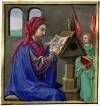



Not with a Scottish maternal grandmother! For me, January 25th is Burn's Night! The haggis, swede and potatoes are sitting on the kitchen worksurface, the malt whisky is opened, the Scottish music CD's are stacked next to the player, and I shall dig out my tartan tie (MacDowall) from the wardrobe. However, I shall not submit any guests to the sight of my knees and a kilt! My dirk will also remain hidden ....
Robert Burns: Ode to a Haggis (1786)
Fair fa' your honest, sonsie face,
Great chieftain o' the pudding-race!
Aboon them a' yet tak your place,
Painch, tripe, or thairm:
Weel are ye wordy o'a grace
As lang's my arm.
The groaning trencher there ye fill,
Your hurdies like a distant hill,
Your pin was help to mend a mill
In time o'need,
While thro' your pores the dews distil
Like amber bead.
His knife see rustic Labour dight,
An' cut you up wi' ready sleight,
Trenching your gushing entrails bright,
Like ony ditch;
And then, O what a glorious sight,
Warm-reekin', rich!
Then, horn for horn, they stretch an' strive:
Deil tak the hindmost! on they drive,
Till a' their weel-swall'd kytes belyve
Are bent like drums;
Then auld Guidman, maist like to rive,
Bethankit! hums.
Is there that owre his French ragout
Or olio that wad staw a sow,
Or fricassee wad make her spew
Wi' perfect sconner,
Looks down wi' sneering, scornfu' view
On sic a dinner?
Poor devil! see him owre his trash,
As feckles as wither'd rash,
His spindle shank, a guid whip-lash;
His nieve a nit;
Thro' blody flood or field to dash,
O how unfit!
But mark the Rustic, haggis-fed,
The trembling earth resounds his tread.
Clap in his walie nieve a blade,
He'll mak it whissle;
An' legs an' arms, an' hands will sned,
Like taps o' trissle.
Ye Pow'rs, wha mak mankind your care,
And dish them out their bill o' fare,
Auld Scotland wants nae skinking ware
That jaups in luggies;
But, if ye wish her gratefu' prayer
Gie her a haggis!








